Who Is Ange Postecoglou? Age, Height, Worth, Career, and More


Ange Postecoglou made history when he was sensationally named as the new manager of English Premier League side Tottenham Hotspur – making him the first Australian to ever coach in the EPL.
The move has received a mixed reception across the football world, but for Australian football fans who have watched on and supported Postecoglou’s journey to the pinnacle of football it serves as a testament to an exceptional football mind who thoroughly deserves the chance to showcase his talent on a platform of such magnitude.
Postecoglou has had to bide his time to get to football’s pinnacle, conquering the A-League, J-League, and Scottish Premier League, and the 2015 Asian Cup on home soil with Australia’s national side, the Socceroos, along the way.
But that doesn’t even begin to scratch the surface of the man Celtic fans affectionately refer to as ‘Big Ange’. And with Postecoglou taking on the biggest task of his career thus far, we wanted to explore exactly what made the Spurs coach who he is today.
In This Ange Postecoglou Story…Ange Postecoglou Quick FactsWho Is Ange Postecoglou?Ange Postecoglou, The Hometown HeroAnge Postecoglou’s Coaching CareerSouth MelbourneFormative Years With Australia’s U17s & U20sA-League Revolutionary Revamping The SocceroosProving Himself In AsiaHow Postecoglou Brought Pride Back To Celtic ParkPostecoglou Takes On Tottenham HotspurWhat Type Of Coach Is Ange Postecoglou?Ange Postecoglou Personal LifeAnge Postecoglou Relationship HistoryAnge Postecoglou Net Worth
Ange Postecoglou Quick Facts
Name:Ange PostecoglouAge:57Date of Birth:27 August 1965Nationality:Nea Filadelfeia, Athens, GreeceHeight:Australian-GreekWeight:5 feet 10 inches / 177cmNet Worth:$5 million (estimated)
Who Is Ange Postecoglou?
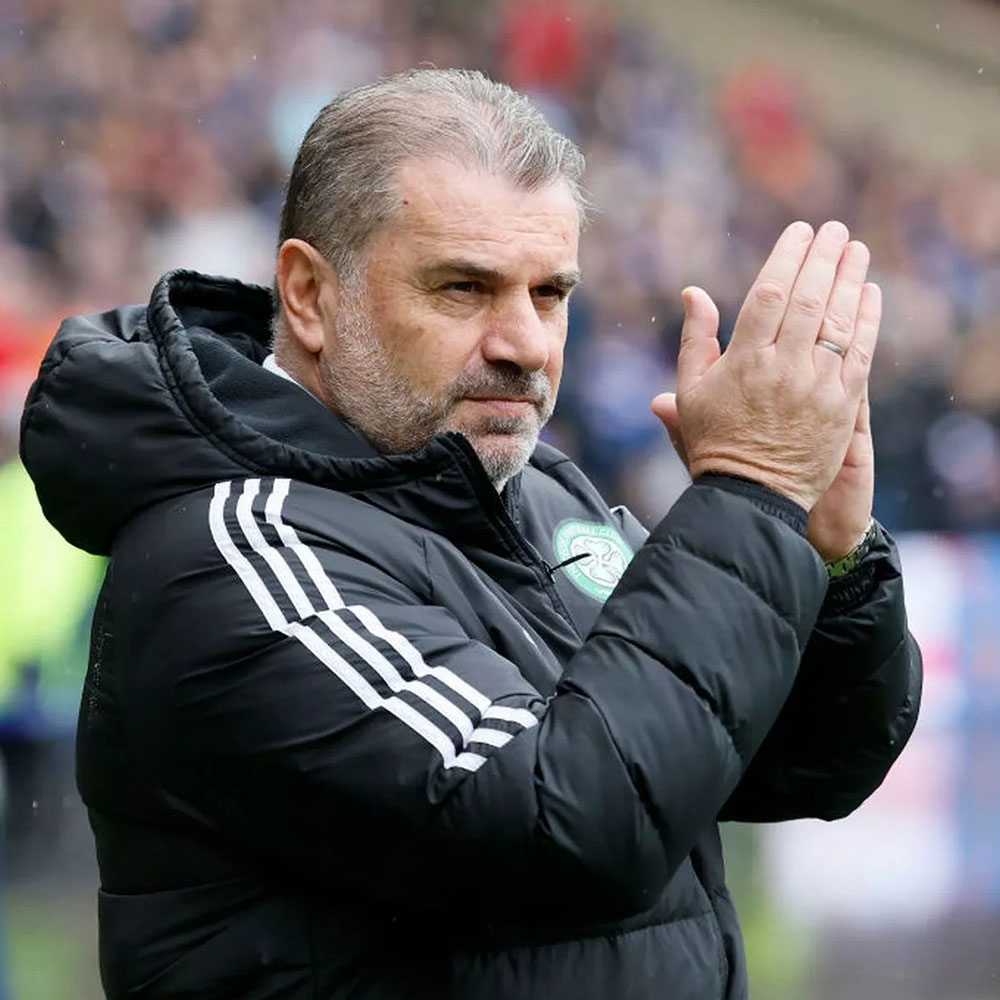 Source: football.london
Source: football.london
Ange Postecoglou is an Australian football manager and former player who is set to be the manager of English Premier League side Tottenham Hotspur from the 2023-24 season onwards. Born in the Athenian suburb of Nea Filadelfeia in Greece, Postecoglou and his family immigrated to Melbourne, Australia by boat after his father suffered the loss of his business during the 1967 Greek military coup.
Postecoglou grew up deeply entrenched in Melbourne’s substantial Greek diaspora community as a loyal supporter of South Melbourne FC, a club formed by Greek immigrants in 1959. He would attend games with his dad and developed a bond with him solely through football. These formative years spent discussing players, results and teams with his father were significant to Postecoglou understanding the game as he does today.
Across his 27-year coaching career, Postecoglou has earned a plethora of honours and trophies, including: two National Soccer League Championships and a Premiership; two A-League Championships and a Premiership; the 2015 AFC Asian Cup; a J1 League Championship; and most recently, back-to-back Scottish Premierships and Scottish League Cups, plus a Scottish Cup, completing a historic treble of domestic trophies in the 2022-23 season.
Ange Postecoglou, The Hometown Hero
Beginning as a player before stepping into coaching, Ange Postecoglou joined the youth system of his boyhood side, South Melbourne, at nine-years-old. A hard-nosed defender with a knack for outsmarting his opposition rather than outplaying them, Postecoglou played 193 games for his beloved South Melbourne, sporting an iconic mullet and moustache combo along the way.
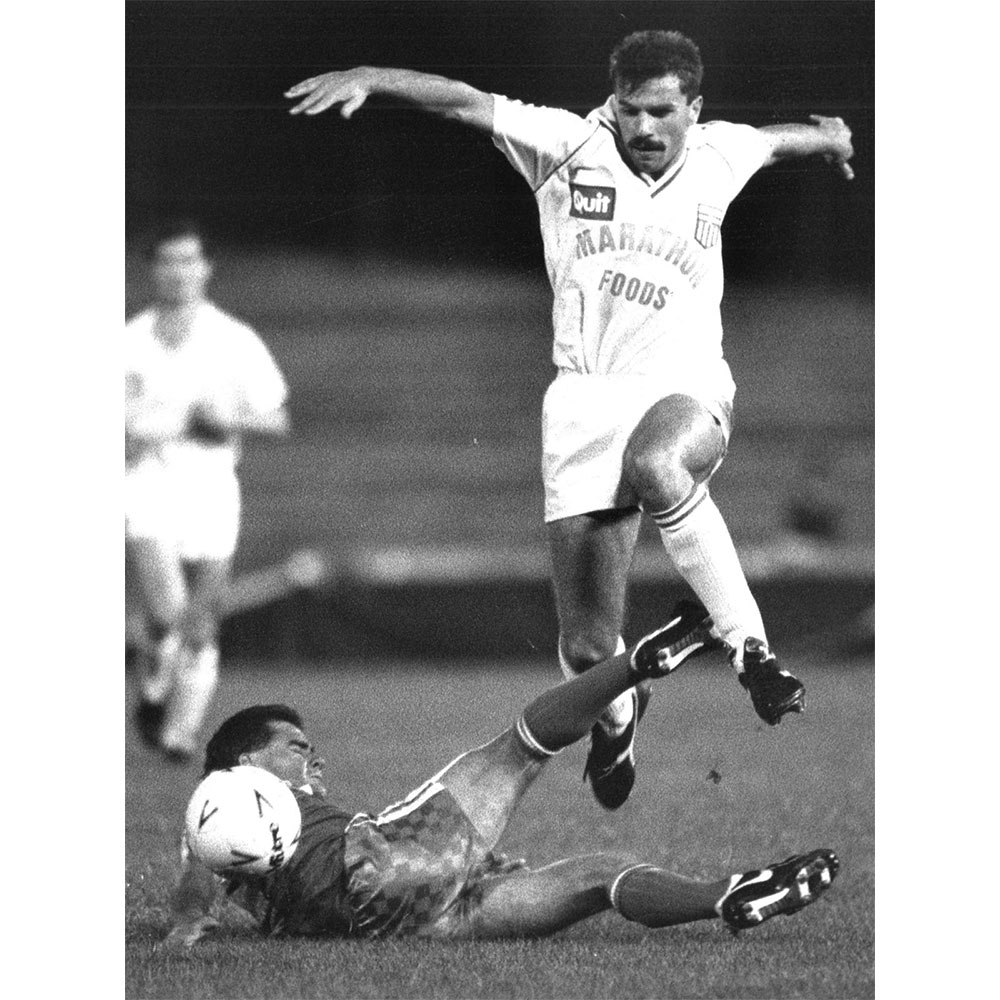 Source: pilbaranews.com.au
Source: pilbaranews.com.au
The ‘local boy come good’ helped South to a National Soccer League title in 1984 and captained them to the title in the 1990-91 season, before a knee injury put a premature end to a career spent entirely with his community club. Postecoglou’s time at South Melbourne was key to his education as a coach, particularly during the period when South were managed by legendary Hungarian Ferenc Puskás, a former player whose magnificent goal scoring feats led to the creation of the Puskás award, which acknowledges the outright best goal scored in a regular football season around the globe.
Ange Postecoglou’s Coaching Career
South Melbourne
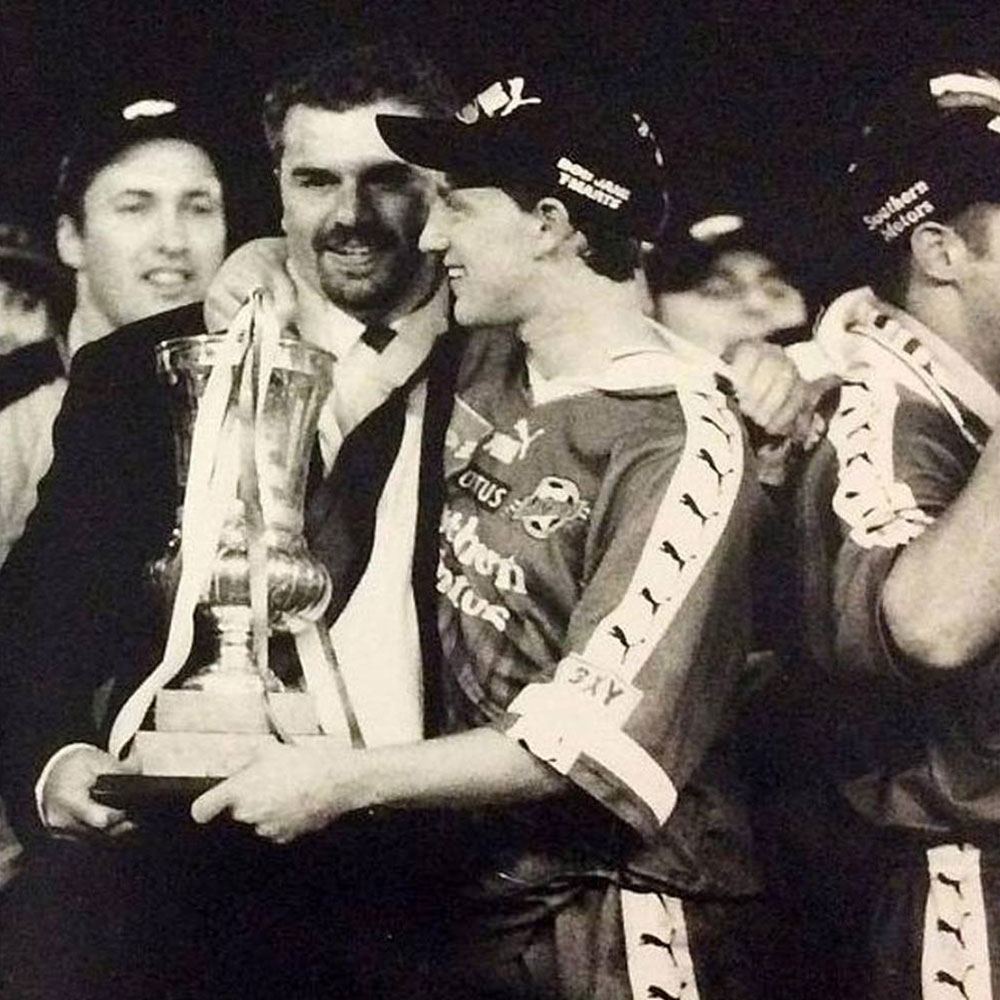 Source: @smfc59 via Facebook
Source: @smfc59 via Facebook
Stepping away from his playing duties following his career-ending injury, Postecoglou joined the ranks at South Melbourne as an assistant coach. He earned his chance to coach the side after the sacking of Frank Arok in 1996, and would subsequently bring glory back to South Melbourne with consecutive title wins in 1997-98 and 1998-99, alongside a 1999 Oceania Club Championship. The Oceania Club Championship then secured South a spot in the 2000 FIFA Club World Championship and an opportunity for Postecoglou to take on renowned Manchester United manager, Sir Alex Ferguson after their famous treble-winning 1998-99 season.
Formative Years With Australia’s U17s & U20s
At the turn of the century Postecoglou made his first foray into international management for Australia, taking on the exciting task of heading up Australia’s under-17s and under-20s national teams. During this period, Postecoglou was in charge of discovering and developing the next generation of Aussie talent, and won numerous OFC Championships and an AFF Championship along the way.
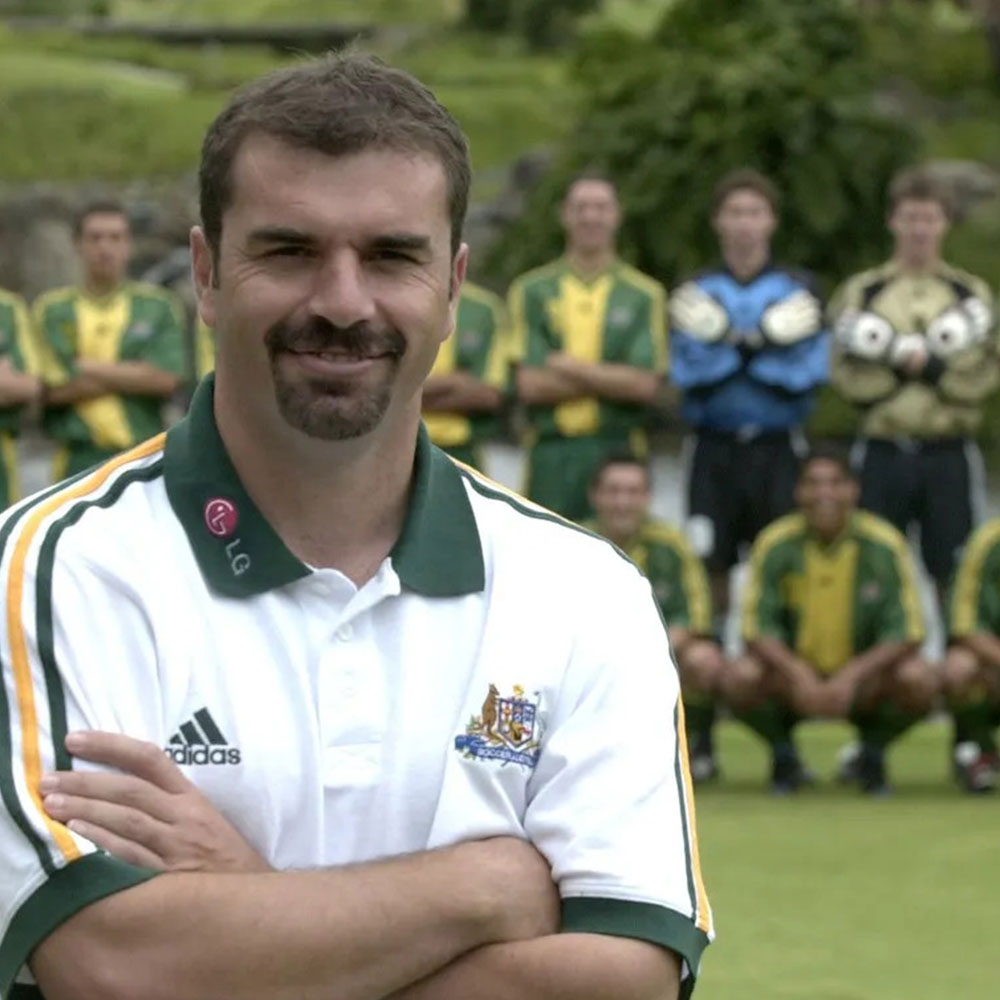 Source: premierleague.com
Source: premierleague.com
However, as results ran amiss and Postecoglou’s under-20s side failed to qualify for the 2007 FIFA U-20 World Cup, the head coach faced scrutiny from back home, leading to a the equivalent of a verbal boxing bout between he and SBS The World Game television host Craig Foster. In the interview, which has now become famous as a reflection of how far Postecoglou has come, Foster (a former Socceroo) criticised the Australian coach and questioned his suitability for the role going forward. The verbal slamming provoked Postecoglou to bite back and famously express his belief that Foster had disregarded their friendship and attacked him.
Whilst Postecoglou’s time coaching the Australian under-17s and under-20s is viewed as a blip on the now Spurs manager’s successful career, it was here where he honed his understanding of where Australian football’s higher powers needed to invest their efforts and the challenges the sport would face going forward in a country where football is not a priority. The incident with Foster, specifically, would prove to be the catalyst for a challenging few years of soul-searching for Postecoglou due to his fears that it marred any potential for a job.
A-League Revolutionary
In an effort to distance himself from the infamous Craig Foster interview and support his family with steady work, Postecoglou took up a chance experiencing the chaos and tribalism of third division Greek football with Panachaiki. Following his sacking at Panachaiki, Postecoglou bounced between roles as a football pundit for Fox Sports, elite consultant at Football Victoria, coach at Whittlesea Zebras, and running his own coaching clinics in Melbourne as he awaited that one opportunity to prove himself.
And it arrived, perhaps unexpectedly in the form of A-League side Brisbane Roar, who needed an individual to set the club straight after previous coach Frank Farina was fired due to a drink-driving charge. Postecoglou rebuilt the side in a manner befitting his own beliefs, going as far as to depart with veteran Socceroo Craig Moore after the two failed to see eye-to-eye. The uncompromising manager who had delivered NSL titles to South Melbourne a decade beforehand was now in charge of a side that had underwhelmed since the start of the A-League in 2005-06, however he made clear to fans and media that it would take time for the Roar to be successful.
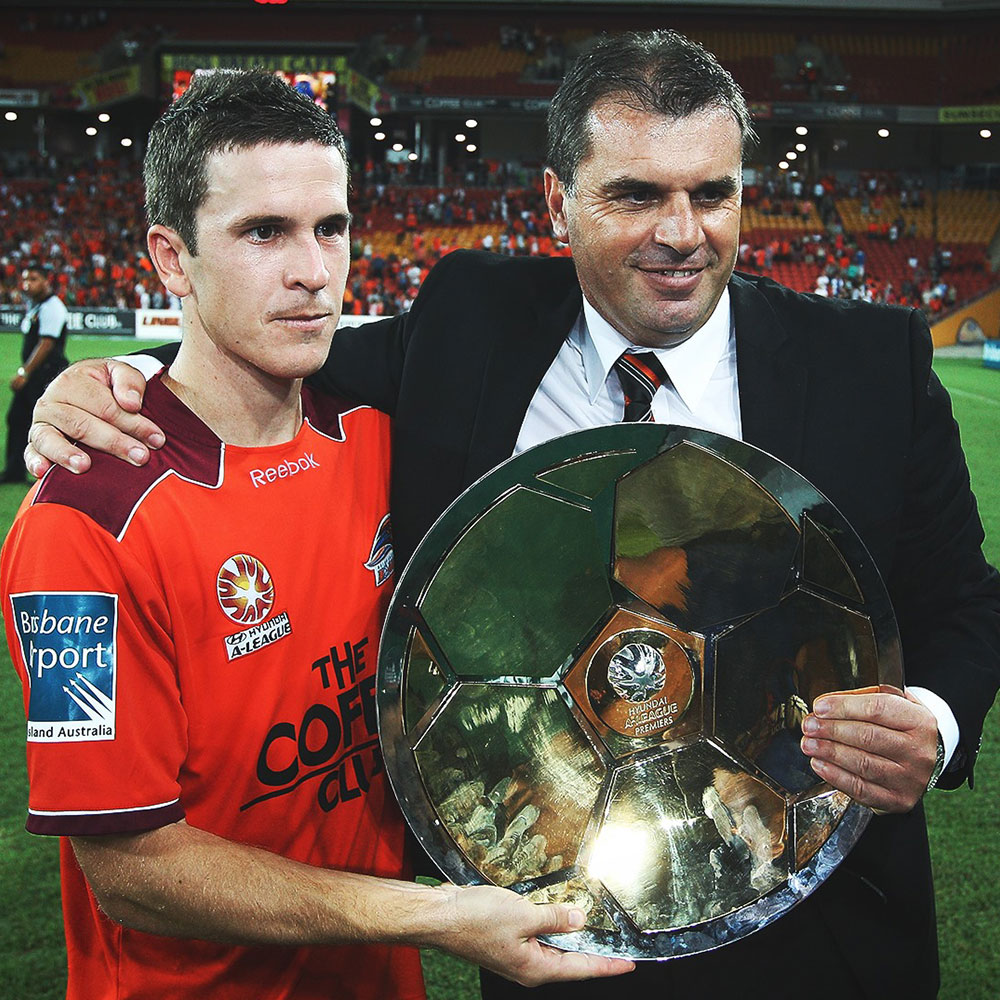 Source: @aleagues via Facebook
Source: @aleagues via Facebook
Postecoglou’s Roar side eventually dominated the A-League and went on to win their first Premiership and earn a dramatic Championship win on penalties in the 2010-11 season. They would back up their magnificent triumph with a consecutive Championship the year after, and would earn the moniker ‘Roarcelona’ as a nod to Spanish side FC Barcelona’s dominance of LaLiga with their own similarly possession-based, attacking style of play. It was here where Postecoglou set a precedent for the methodology that would take him right through to the English Premier League, and would earn Brisbane the record of 36-games unbeaten in the A-League. A stopover with Melbourne Victory would follow from 2012 to 2013 before Postecoglou received the call to coach a Socceroos side undergoing their own tumultuous period of results.
Revamping The Socceroos
Inheriting a Socceroos team in desperate need of evolution and rejuvenation ahead of a major international tournament (in this case, the 2014 Brazil World Cup), Postecoglou had a mammoth undertaking on his hands. The Australian national team was at their lowest point in years following back-to-back 6-0 losses to football powerhouses France and Brazil. Crucially, they had lost the faith of the Australian sporting public as they appeared afraid and timid in the face of their opposition under previous coach Holger Osieck. Postecoglou would work diligently to rectify this and bring dignity back to the Socceroos.
Postecoglou parted ways with stalwarts Mark Schwarzer, captain Lucas Neill, and Luke Wilkshire (members of Australia’s Golden Generation) in favour of ushering in a new wave of talent. Postecoglou’s new-look Socceroos side would fail to progress past the group stage of the 2014 World Cup, but would win plenty of support from Australian fans who had their pride in the side restored after brave performances against the likes of Chile, Holland, and Spain.
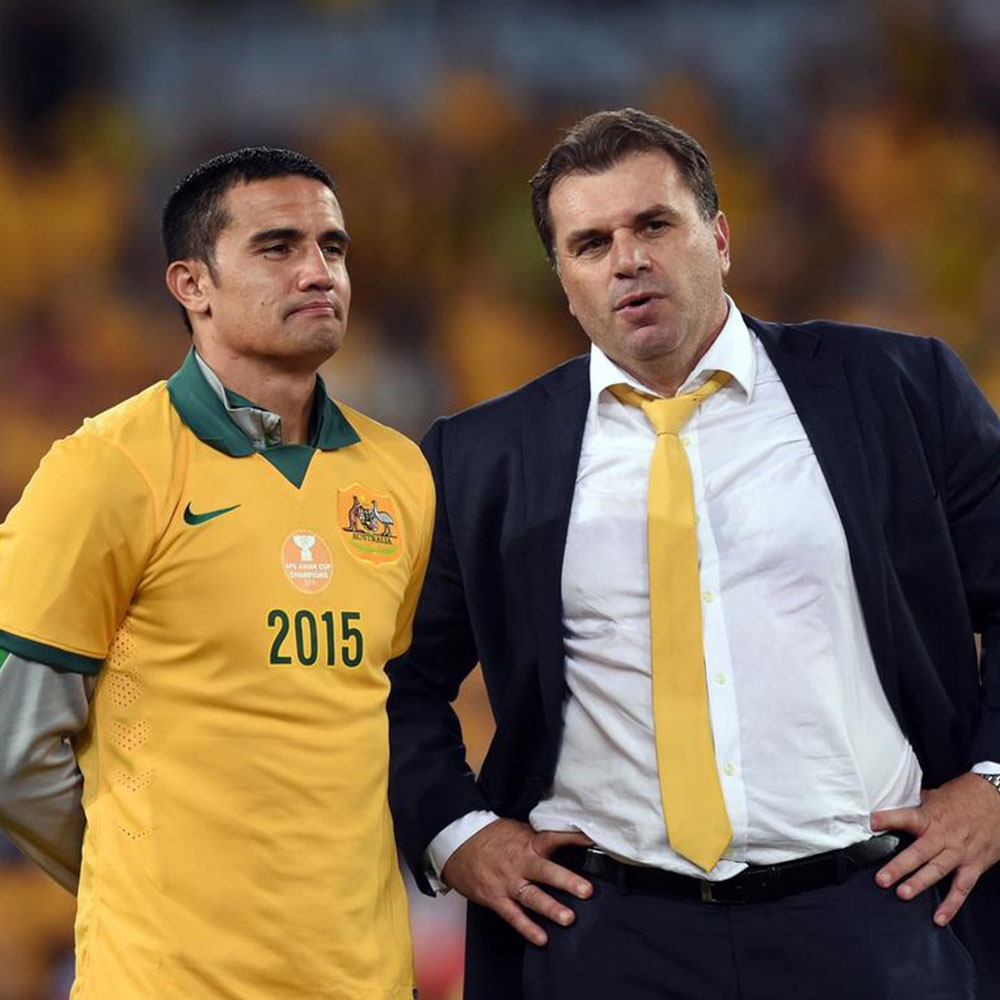 Source: news.com.au
Source: news.com.au
Australia would experience their finest moment under Postecoglou when, 18 months into his reign as head coach, they defeated South Korea to hoist the 2015 Asian Cup in front of 75,000 roaring football fans. Postecoglou had the nation on board, and Socceroos fever was the best it had been in a long time.
This public favour began to diminish as Postecoglou began to shift his focus from just securing qualification to the 2018 World Cup, to securing qualification with a distinct style that Australian teams could use as the template of their football identity going forward. It led to a mixed bag of results, and football pundits were unsure whether to blame the calibre of players at Australia’s disposal, or Postecoglou’s insistence on playing his way.
This challenging period led to Postecoglou becoming less friendly with the media and internal clashes with Football Federation Australia, the governing body for football in the country, that had been sparked when the Socceroos coach criticised the FFA for causing a distraction from the Socceroos because of a pay dispute with Professional Footballers Australia. Postecoglou appeared defeated at the lack of alignment with his vision for Australian football, and despite leading Australia to the 2018 World Cup, Postecoglou confirmed his departure from the Socceroos 6 months shy of the 2018 World Cup he had worked tirelessly to qualify for.
Proving Himself In Asia
A return to club football after a long five years on the international stage with the Socceroos with Japanese club Yokohama F. Marinos gave Postecoglou the chance to take on a unique project. His first season in charge saw his team finish in 12th with the second-most goals scored, and the second-most goals conceded, indicating that Postecoglou’s philosophy of attacking football was slowly becoming embedded in the team despite finishing in the bottom half of the table.
After knocking back an offer to manage the Greek national team ahead of the 2019 J1 League season, Postecoglou would lead his Yokohama team to the Championship in sensational and stylish fashion. The result meant that Postecoglou had returned glory to a side that had last won the league in 2004, becoming the first Australian manager to do so in the process.
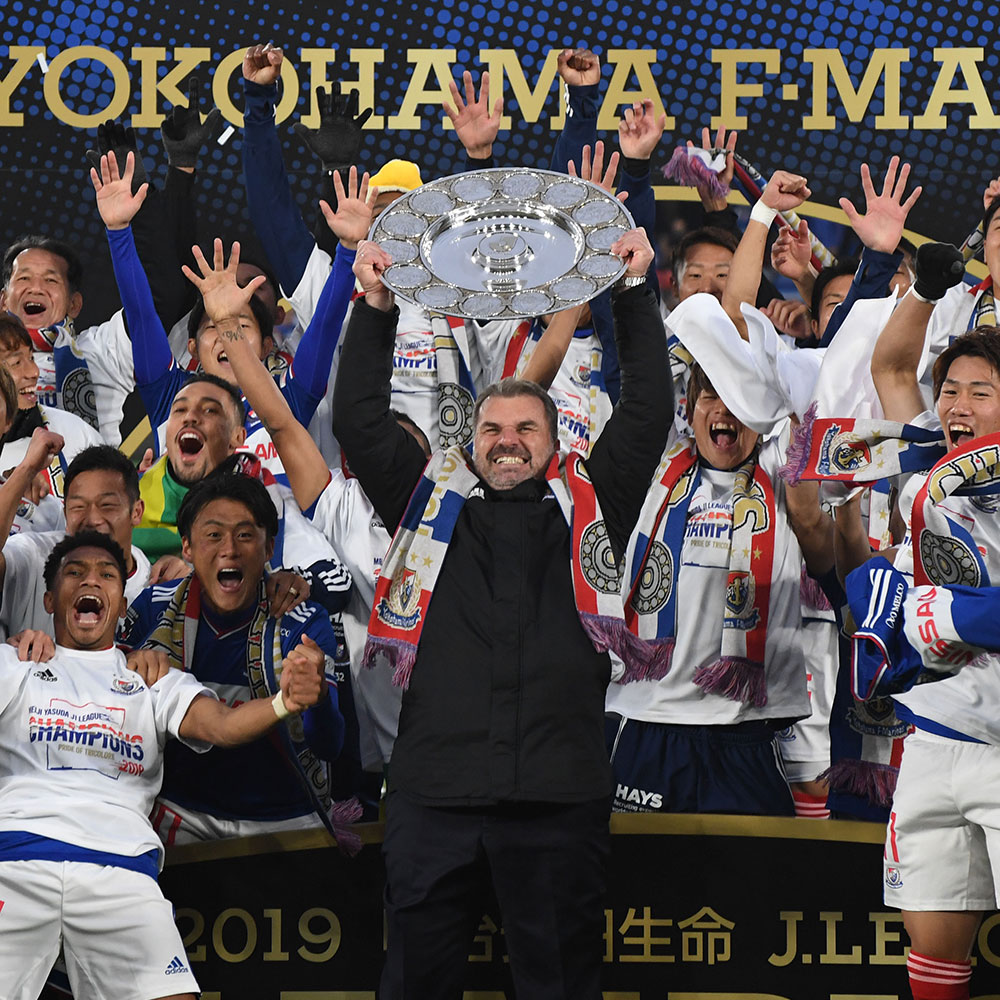 Source: sport.optus.com.au
Source: sport.optus.com.au
How Postecoglou Brought Pride Back To Celtic Park
Scottish Premiership side Celtic are a historic and iconic club that are followed by millions of supporters across the globe. In mid-2021, the legendary Scottish club were still reeling from their title loss the previous season to rivals Rangers and needed a figure to bring prosperity back to the club. In comes Ange Postecoglou, attracting the ire of fans and public figures alike as many questioned the appointment based on his status as an Australian coach with barely any European coaching experience to his name.
Back-to-back Scottish Premierships, Scottish League Cups, and a Scottish Cup followed as Postecoglou shifted the perceptions of many who reacted to his initial appointment with jibes such as ‘Ange Postecog-who?’. Postecoglou entered the club a relative known and has since departed with a cult-like following from Celtic’s fervent and loyal fanbase.
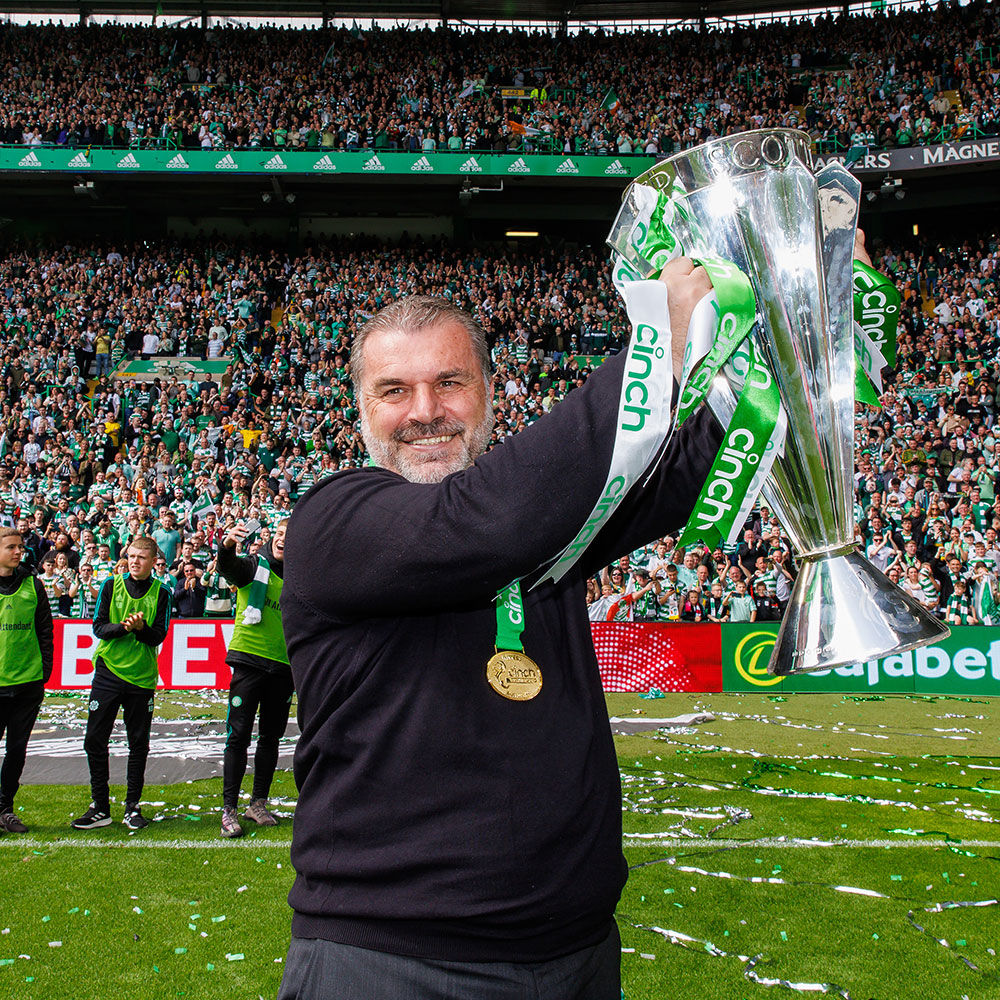 Source: thescottishsun.co.uk
Source: thescottishsun.co.uk
During his time with Celtic, Postecoglou’s interactions with Scottish media – who are famous for hounding coaches and players relentlessly – won him many fans. Postecoglou would have learned from his time facing criticism from the media whilst with the Socceroos that he needed to have greater poise to handle the harsh Scottish press. And that he did, with a signature dry wit that left many in awe of the self-assuredness of the man in the hot seat.
Postecoglou Takes On Tottenham Hotspur
Tottenham Hotspur; a side so well-known for their consistent ‘bottling’ of matches they have earned their own personalised version of the phrase dubbed ‘Spursing’. It therefore seems like a match made in heaven to bring in a coach accustomed to success, in the form of Ange Postecoglou, to lead a club forever referred to as perennially underwhelming.
Postecoglou is set to take charge of Spurs from July 1 ahead of the 2023-24 Premier League season, and will be eager to rejuvenate a side that has failed to build off of the success and identity that was instilled by current Chelsea manager, Mauricio Pochettino, before his departure in 2019. The move represents the next natural progression in Postecoglou’s career, and will be a chance for Ange to prove himself in the most lucrative football competition in the world.
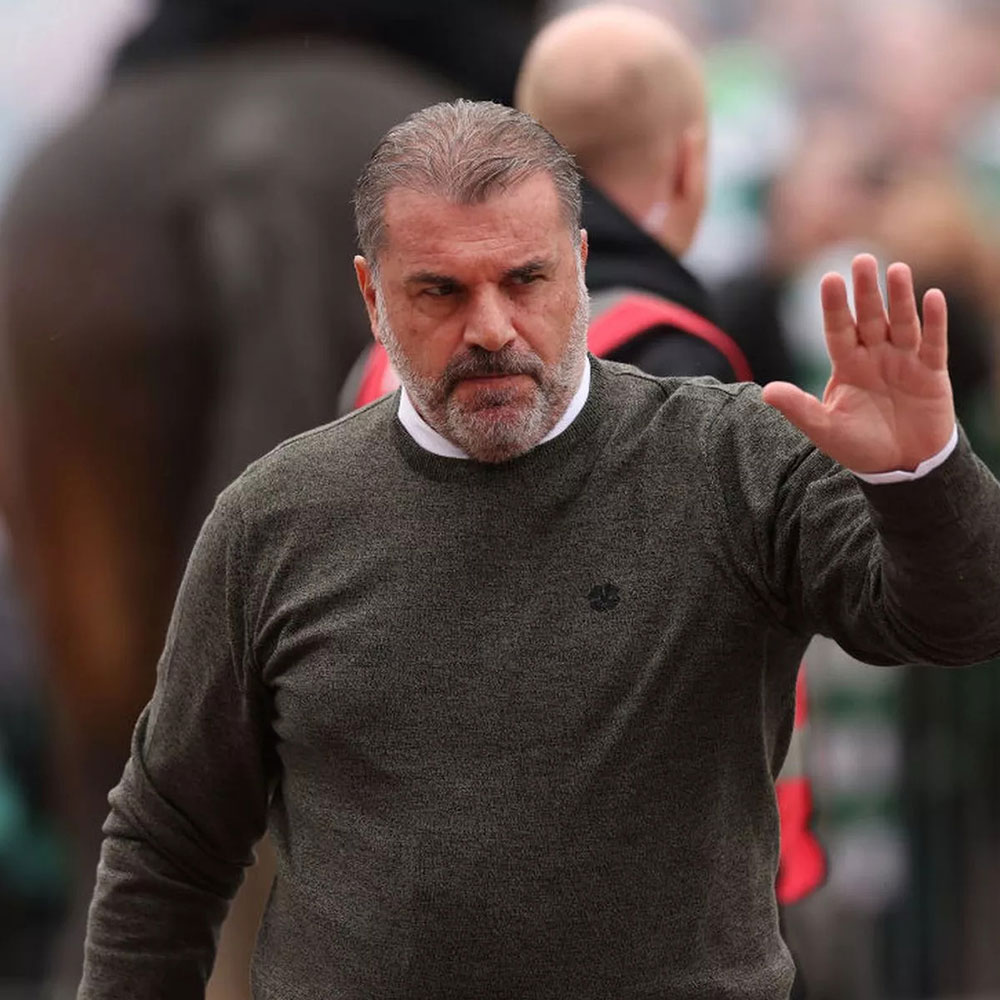 Source: football.london
Source: football.london
Spurs fans and club chairman Daniel Levy will have to remain patient with Postecoglou as he immerses himself in the club in an effort to deliver their first trophy since their League Cup win in 2008. Speaking after signing with Spurs, Postecoglou promised to deliver a team that the fans would “get excited by”, and one that he hopes “embodies the values and traditions of this fantastic football club”. It does not sound like much yet, but Spurs fans will be impressed by Postecoglou’s professionalism and awareness as a coach, particularly after the hiring of legendary coaches Jose Mourinho and Antonio Conte ended poorly. Postecoglou’s use of the pronouns “we” and “us” in his greeting to fans is as clear an indication of the approach he will take in coaching the club. For Postecoglou, it is fundamentally about the success of the club and its fans – not him and his career.
What Type Of Coach Is Ange Postecoglou?
Ange Postecoglou has won fans over at every club he has coached at. Throughout his career he has walked into teams with little fanfare over his name and has left with the full adoration of players, pundits, and supporters. But how does he achieve this? In a sporting environment where ego is lauded, Postecoglou serves as a breath of fresh air because of his lack of ego and indifference to surface-level thinking. In addition, Postecoglou draws inspiration from the likes of legendary football minds Marcelo Bielsa, Pep Guardiola, and Ferenc Puskás.
As a coach to his players in the day-to-day, Postecoglou keeps his distance. From there, once he has them believing in his vision, Postecoglou typically relies on his assistant coaches to deliver his instructions. Ultimately, Postecoglou is a coach who wants his players to reflect his own philosophy of fearlessly taking on seemingly insurmountable obstacles, and never detracting. He is known for his inspiring pre-match speeches and insists that his sides play an attacking brand of football, to the point where results take second priority to the implementation of style and players earn his ire for failing to commit to the process. Despite this, he cares deeply for his players and encourages them to never take a backward step in the pursuit of success.
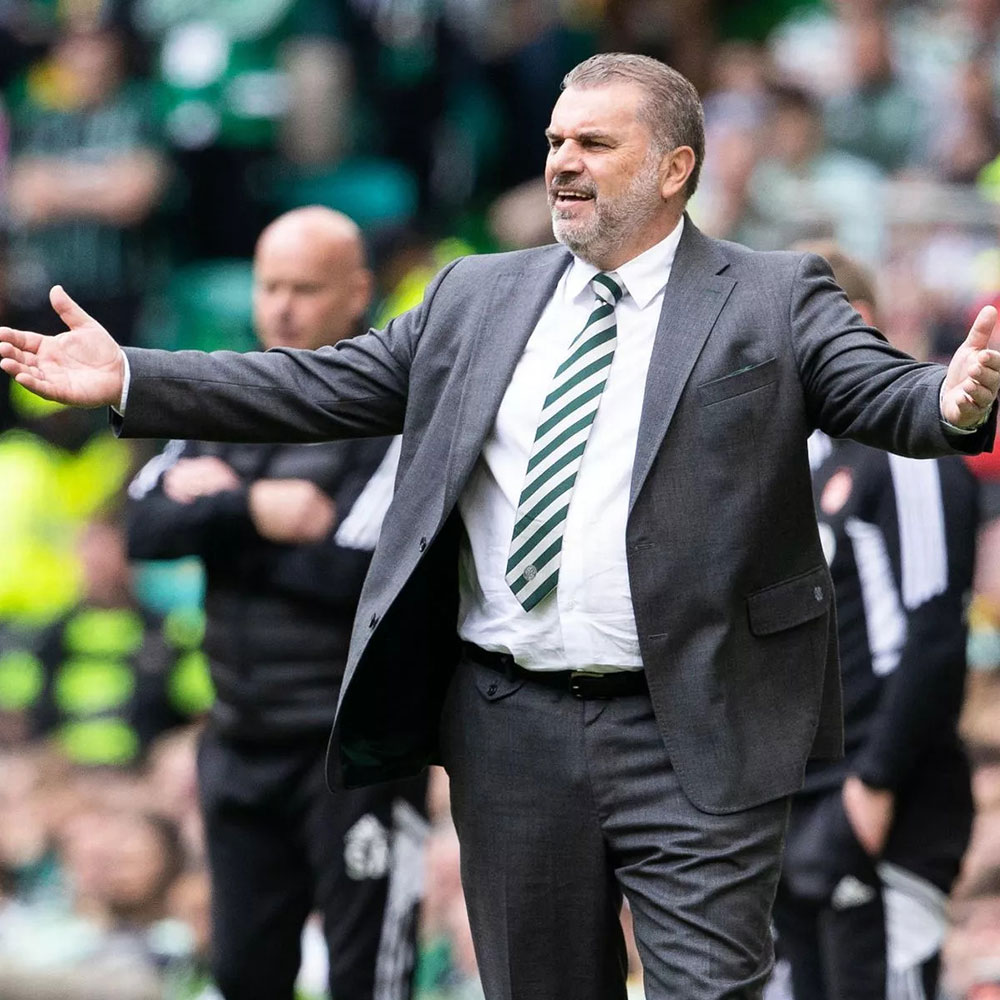 Source: dailyrecord.co.uk
Source: dailyrecord.co.uk
Tangible success is often a slow burn for waiting fans and is something that takes Postecoglou time to cultivate. Even if results aren’t there right away, fans can expect a Postecoglou team to be brave, with players often galvanised by Postecoglou’s passionate coaching style to take on their opposition without self-doubt. Postecoglou’s impact, from a tactical and emotional perspective, will more than likely leave fans smitten regardless of the degree of success.
A coach that relishes being in the trenches as much as he does experiencing the highs of seeing his swashbuckling style of play come to fruition, Postecoglou is often praised for refusing to shirk his playing style for the sake of pragmatism or results-oriented thinking. Toeing the line between enigmatic and articulate, Postecoglou treats football with a depth of thought that reflects his long standing love affair with the sport. He is meticulous in his preparations, and has been ever since his time coaching South Melbourne in the 1990s.
In his 2016 book ‘Changing The Game’, Postecoglou combined personal anecdotes about life growing up in Australia, his coaching career, and his thoughts on the state of Australian football at that time. Whilst we can, to a degree, attempt to explain Postecoglou’s mindset as a coach, nobody can do his approach justice better than the man himself. When breaking down his perception of the wider implications of a match of football, Postecoglou stated:
“The beauty of sport is that in a very short space of time, all themes and messages are crystallised on the field of play. There is nowhere to hide. What you stand for is on show for all to see.”
Whilst the full extent of Postecoglou’s legacy won’t be known until long after his retirement, his impact on football, particularly in Australia, cannot be denied. His exploits conquering Asia and Europe with Yokohama F. Marinos and Celtic respectively, have earned him a rare opportunity to represent Australian football on a global level. To put it simply, Australian coaches and players will have a greater spotlight on them than ever before by following in Postecoglou’s stead.
Ange Postecoglou Personal Life
Undoubtedly Ange Postecoglou is a passionate football coach, but some fans may not know that he is also an avid football fan who grew up collecting football magazines and memorabilia to satisfy his endless love of the world game. He’s even been known to dabble in Sports Interactive’s Football Manager video game series on long haul flights and in-between coaching jobs.
 Source: Amazon.com
Source: Amazon.com
An Australian with Greek heritage, Postecoglou has often opened up about the challenges his parents underwent to provide for him and his family upon arrival in Australia. Postecoglou has spoken about the impact of his parents, and in particular his father, on him and his approach to football. Being notoriously difficult to please, Postecoglou Sr. was always the first to keep his son grounded when he was at a high – to a painful degree. His high standards and perfectionism were imparted on a young Ange, leaving him forever committed to pushing his teams to a level of greatness beyond which they’re expected to achieve.
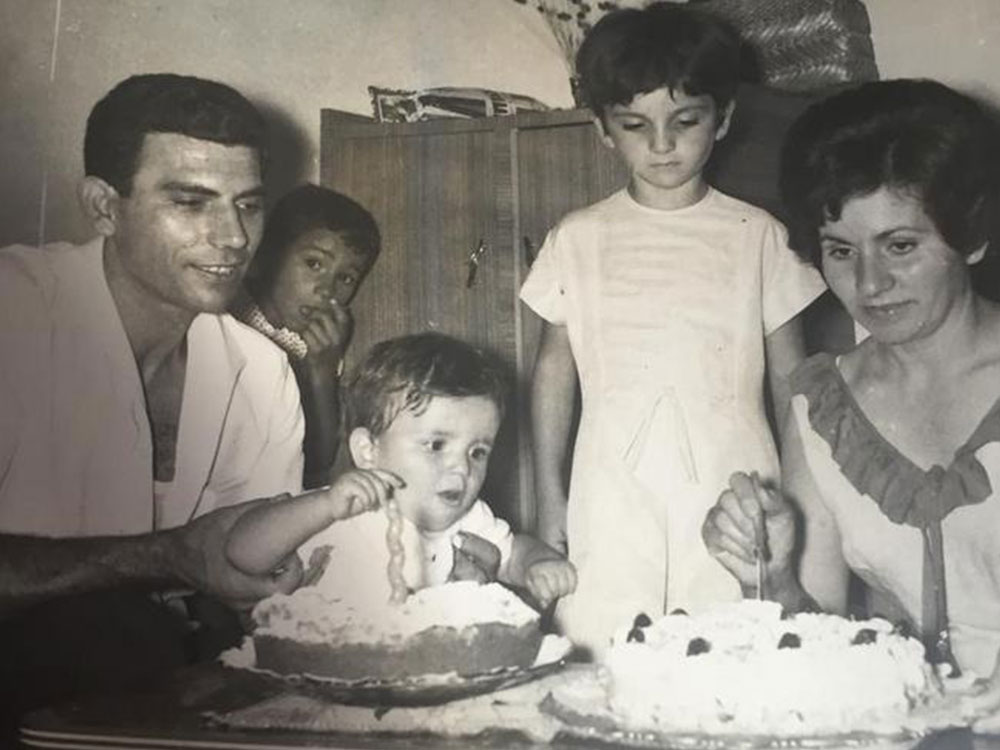 Source: heraldsun.com.au
Source: heraldsun.com.au
Postecoglou is a considerate, intelligent, and self-effacing individual who takes the time to understand the values of the cities he represents as a coach, winning fans over by being present and connecting with them, even going as far as to donate to charities in the city his team hails from and giving gifts to fans.
Ange Postecoglou Relationship History
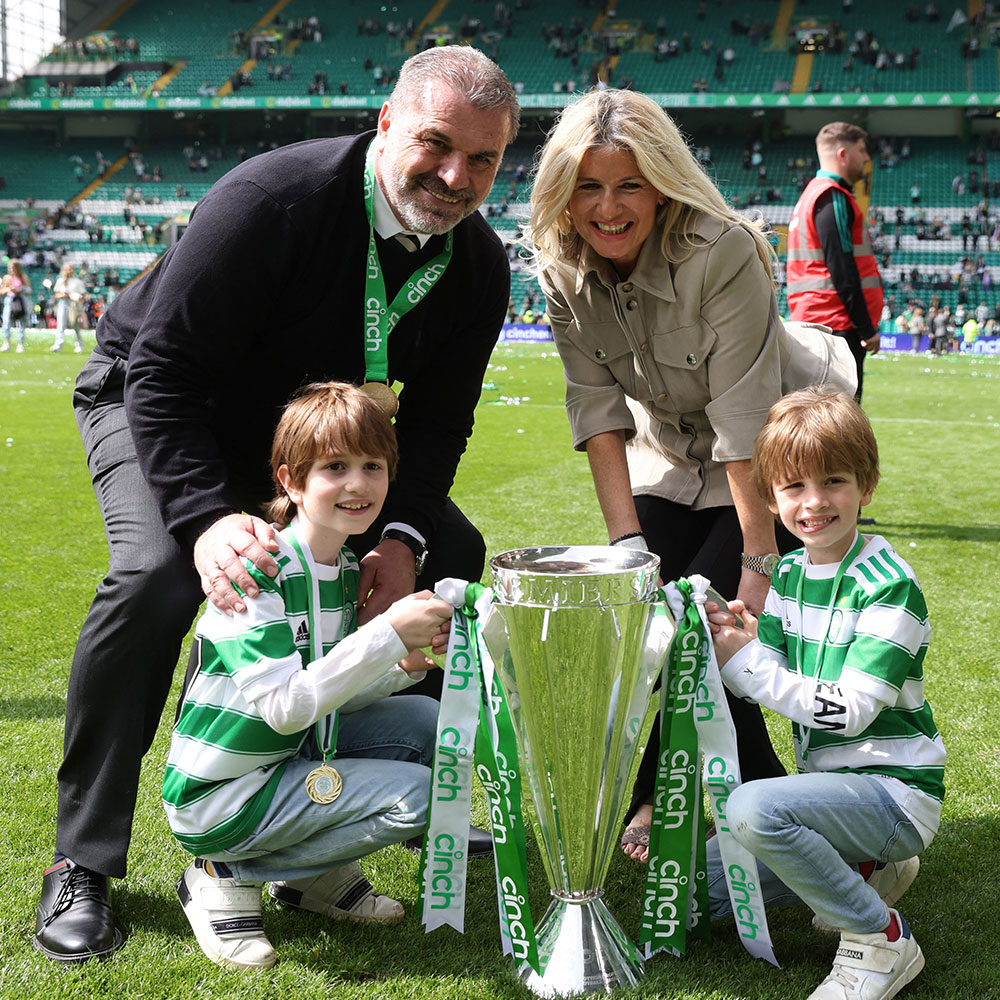 Source: thescottishsun.co.uk
Source: thescottishsun.co.uk
Ange Postecoglou has been married to his wife Georgia Postecoglou since they met in the late 1990s when Ange was a coach of South Melbourne FC. Georgia was a marketing manager at the club and spoke in a 2015 episode of ABC’s ‘Australian Story’ series titled ‘The Age Of Age’ about the fact that her now husband was far from being a “charmer” when she first met him. Despite this, the two formed a strong connection and would eventually marry and welcome three children: James, Max and Alexi.
Ange Postecoglou Net Worth
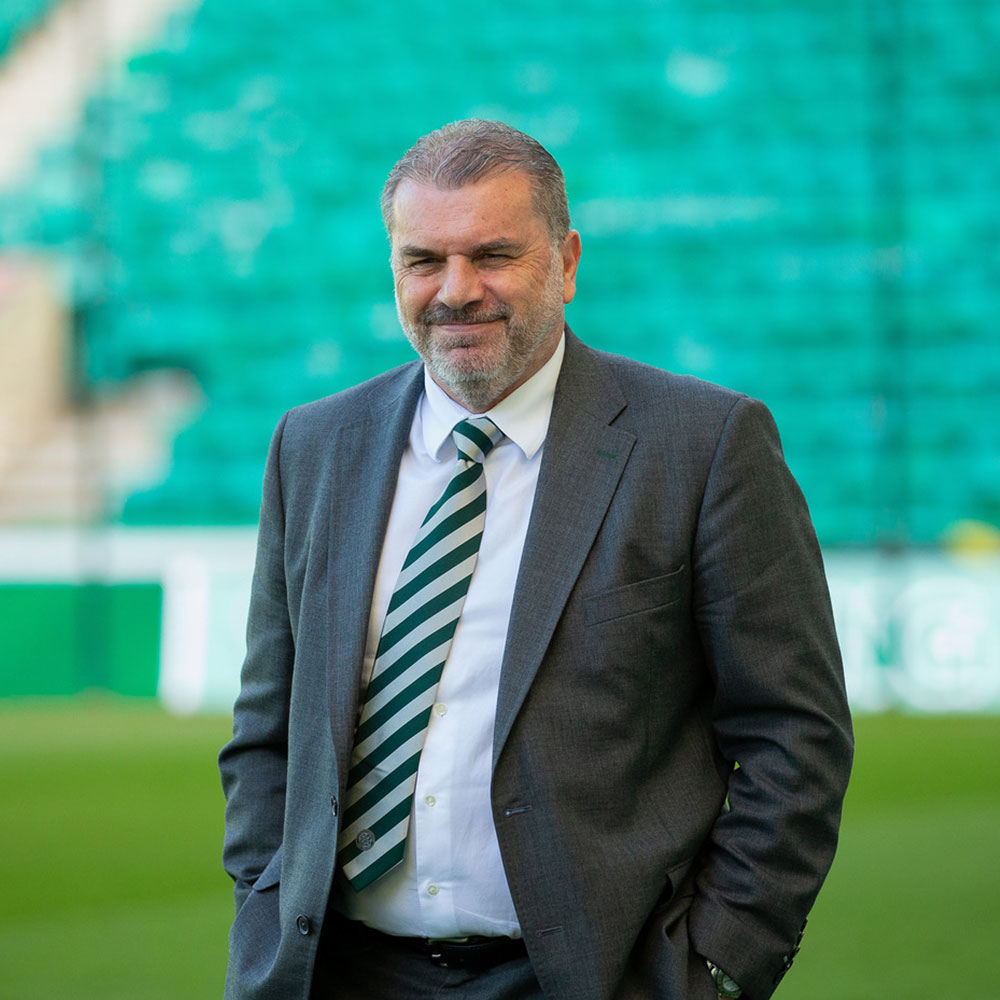 Source: thecelticstar.com
Source: thecelticstar.com
Incoming Tottenham Hotspur manager Ange Postecoglou has an estimated net worth of $5 million. Tottenham recently appointed Postecoglou to take the reins at the club and were willing to pay a $9.4 million compensation fee to his former club Celtic to bring the Australian in. Whilst his Spurs salary is currently unknown, his successful coaching career has seen him take on high-paying roles at Celtic, Japanese side Yokohama F. Marinos and the Socceroos, Australia’s national team, meaning he has likely accumulated significant wealth through his work, with his triumphs undoubtedly securing him large bonuses. Away from football, Postecoglou is a successful author, keynote speaker and brand ambassador.
The post Who Is Ange Postecoglou? Age, Height, Worth, Career, and More appeared first on DMARGE.





